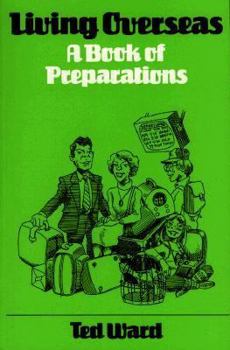Living Overseas: A Book of Preparations
Select Format
Select Condition 
Book Overview
Gives practical advice about learning to live in foreign cultures, discusses common problem areas, such as time and food, and stresses the importance of interpersonal relationships. This description may be from another edition of this product.
Format:Paperback
Language:English
ISBN:0029339405
ISBN13:9780029339404
Release Date:December 1984
Publisher:Free Press
Length:358 Pages
Weight:1.35 lbs.
Dimensions:1.0" x 6.1" x 9.2"
Customer Reviews
2 ratings
The Most Important Preparation
Published by Thriftbooks.com User , 21 years ago
Among books that prepare people for working overseas, this book is really the spirit behind the move- focusing on the spirit of the person moving, how they will approach life and reality. It is designed to make one look at themself, to grow, and truly be ready in their soul for the move, and ready to face new challenges that can not be foreseen. Especially valuable are the self-reflection questions at the end of each chapter, so that this is a book of applications and not only theory; and the games at the end of the book, so that application is not individualistic but corporate. Ward clearly comes from a Christian perspective, making use of the vast plethora of Christian and Biblical historical examples in his writing, but it is in no way overbearing, so any non-Christian will enjoy this book and learn from it. The one drawback in the book- Ward tends to denigrate enculturation/incarnation/contextualization, describing it with a laden pejorative of "going native"- a phrase that really hearkens back to the imperialism that Ward so rightly rejects throughout his book. In the use of the phrase, Ward apriori removes the very positive aspects of those who are able to become like the people they feel lead to live with- an approach to cross-cultural interaction which has been highly successful for millennia. And no higher expression of love can be, then to cease to be differentiated from those you care about, so great is your identification.That aside, this book is highly recommendable to all those who are traveling overseas, for whatever reason, to be prepared for living overseas, in the most important way possible. I learned much about myself, and Ward deeply explores American culture, following the belief that we need to understand ourselves in order to understand the other, and in understanding the other, we more fully understand ourselves. I had not realized before that it was a peculiarly Western trait to constantly want to know "Why", and feel that there is a right to know "Why". There is a bit here and there of the pragmatic, but most of the book is much more than practical- it's how to survive any possibility, because you have prepared your spirit, soul, and mind.
Living Overseas: A Critical Review
Published by Thriftbooks.com User , 24 years ago
Ted Ward, professor emeritus at Trinity Evangelical DivinitySchool, is certainly no upstart in the field of cross-cultural living.In fact, he has been involved in research and consulting work in over sixty countries. In addition to his practical experience, Ward is a prolific writer. The massive bibliography of Ward's published articles and books speaks of his talent as an effective communicator. In his book Living Overseas A Book of Preparations, Ward combines his hands on training and excellent writing style to produce a lasting work. According to Ward, too many books on overseas living provide nothing more than a warning list of situations to avoid. The problem with such an approach is one of focus. Ward contends that attention should be directed on positive attitudes not merely hypothetical situations. Furthermore, many treatments of how to adapt to another culture deal exclusively with what one should do once overseas. Consequently, such works come up short regarding pre-field preparation and/or reentry strategies. Ward's aim in Living Overseas is to prompt his readers to prepare for life overseas (before departure), maximize their experience while overseas, and successfully re enter their home culture. Although he aims extremely high, Ward manages to hit the mark. By using real life examples and coherent progression of thought, Ward leads the reader on an exciting journey from pre -flight instructions to homecoming bliss... Ward warns his readers not to try to loose the identity of their home culture altogether. To "go native" often works to one's detriment and rarely improves matters. Ward does a good job encouraging the reader to adapt to differing cultures without masking one's true identity. Ward gives a strong warning about the we/they mentality of too many overseas workers... The principles in Ward's book not only read well, they actually work. After preparing the worker for the field, Ward gives advice for those already in a different culture. First, he points out that in the field, unlike the classroom, spontaneity weighs heavy. Once on the field, the worker cannot act according to a pre written script. This section echoes an idea mentioned in previous chapters. The idea being that pre field training should focus not on particular problem situations, but rather on coping strategies. The acquiring of these strategies prepares the worker for any situation that might arise. Although Ward makes his point, he tends to contradict himself somewhat. Does he forget that the incorporation of specific (situational) examples is a major strength of this book? He downplays examples in favor of coping strategies, yet the book is rife with specific illustrations of intercultural conflicts. Thankfully, Living Overseas offers a plethora of practical insight including, but not limited to, coping with the following: insults, the closed minded, physical threats, politeness, rudeness, deference, aloofness, being stared at, being left ou






